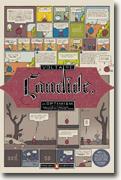Candide: Or, Optimism
Voltaire
book reviews:
· general fiction
· chick lit/romance
· sci-fi/fantasy
· graphic novels
· nonfiction
· audio books
· author interviews
· children's books @
curledupkids.com
· DVD reviews @
curledupdvd.com
newsletter
win books
buy online
links
home
for authors
& publishers
for reviewers

 |
Candide: Or, Optimism Voltaire Penguin Translated by Theo Cuffe Paperback 200 pages October 2005 |
|
“All is for the best” in this, the “best of all possible worlds.” Never mind the atrocities and civil war in Iraq, or the genocide in Darfur, or the infected-blanket politics of influence peddler Jack Abramoff, or the hate-mongering of religious zealots, or—wait—wrong century. No big deal, all is well and proceeding according to plan.
Master satirists of their respective centuries and cultures, Voltaire and Vonnegut were both concerned with the portrayal of evil. As humanist students of the Enlightenment, neither has been content with a metaphysical explanation of evil. The target of both, too, is often religion. In Vonnegut’s Cat’s Cradle, for instance, the prophet Bokonon argues that all religion is composed of lies, but that humans need lies in order to mitigate the misery of existence. Candide, arriving hungry and broke in Holland, panhandles an anti-Catholic ranter. Asked if Candide thinks the Pope is the anti-Christ, Candide replies simply, “I’ve never heard of that.” The ranter tells him he deserves to go hungry. But the ranter’s wife, eavesdropping from the window above the street scene, hears Candide’s “blasphemy” and empties a chamber pot on his head. The narrator remarks, “Oh! To what excesses does religious zeal carry the ladies.” Candide learned his optimism from Dr. Pangloss, a caricature of Newton’s rival, the seventeenth-century mathematician and philosopher Gottfried Leibniz (they invented calculus at the same time and battled for priority). Leibniz is credited by modern philosophers and cosmologists for originating the many-worlds hypothesis. He argued that God, in the act of creating the universe, had many worlds to chose from and, being omniscient and all that, picked the best possible world from the available choices. It is questionable whether Pangloss is an accurate parody of Leibniz or, more likely, of Leibniz’s zealous disciple, Christian Wolff, who did much to damage Leibniz’s reputation by simplifying his mentor’s thinking. Be that as it may, Candide lives under the tutelage of Pangloss in a richly appointed, rural German paradise—until he is kicked out. Forced to make his way in the world, Candide sees all manner of human depredation and degradation but it all, so to speak, goes in one ear and out the other. After Lisbon is largely demolished in an earthquake (in 1755, a few years before Voltaire penned Candide), the Catholic priests decide to hold an auto-da-fe, because roasting a few people over a “slow fire” was a sure way of placating the earth from any further quaking. After the embers die down, though, another devastating quake levels the rest of the city. All is well, though, because God planned that the citizens should build a new, better city. When a storm washes a friend of Candide’s off the ship they are sailing on, Candide is reminded that this particular bit of ocean was specifically made for the drowning of the friend. Panglossism, naïve optimism in the face of contradictory evidence, abounds as much (or more) today as in Voltaire’s time. This little story, written in three days, is a bracing reminder of what complete idiots most humans are. Candide has never gone out of style and appears in English in a number of translations. Cuffe’s new one is fine, respecting, as it does, some of the classic lines of the earlier translations (such as the delightful last line, “But we must tend our gardens”). Penguin’s paperback edition sports a comic-book-style cover drawn by Chris Ware (Jimmy Corrigan: the Smartest Kid on Earth) that is funny and useful. An introduction by historian Michael Wood is included as well, making for an altogether satisfying package. Originally published on Curled Up With A Good Book at www.curledup.com. © Brian Charles Clark, 2006 |
|
|
|
 Click here to learn more about this month's sponsor! |
|
| fiction · sf/f · comic books · nonfiction · audio newsletter · free book contest · buy books online review index · links · · authors & publishers reviewers |
|
| site by ELBO Computing Resources, Inc. | |
 Candide’s optimism in the face of injustice, suffering and despair has inspired two-hundred-years’ of parody and satire. Kurt Vonnegut recommends Voltaire’s classic skewering of philosophical optimism (or, rather, its misinterpretation in the popular culture of eighteenth-century France), and it is clear that Candide’s naïve “all is for the best” has aged well, maturing into Billy Pilgrim’s blithely stoic “so it goes.”
Candide’s optimism in the face of injustice, suffering and despair has inspired two-hundred-years’ of parody and satire. Kurt Vonnegut recommends Voltaire’s classic skewering of philosophical optimism (or, rather, its misinterpretation in the popular culture of eighteenth-century France), and it is clear that Candide’s naïve “all is for the best” has aged well, maturing into Billy Pilgrim’s blithely stoic “so it goes.”